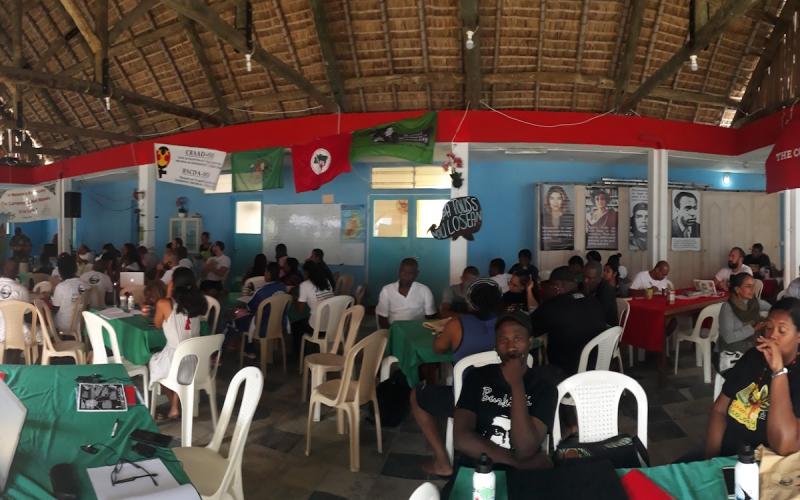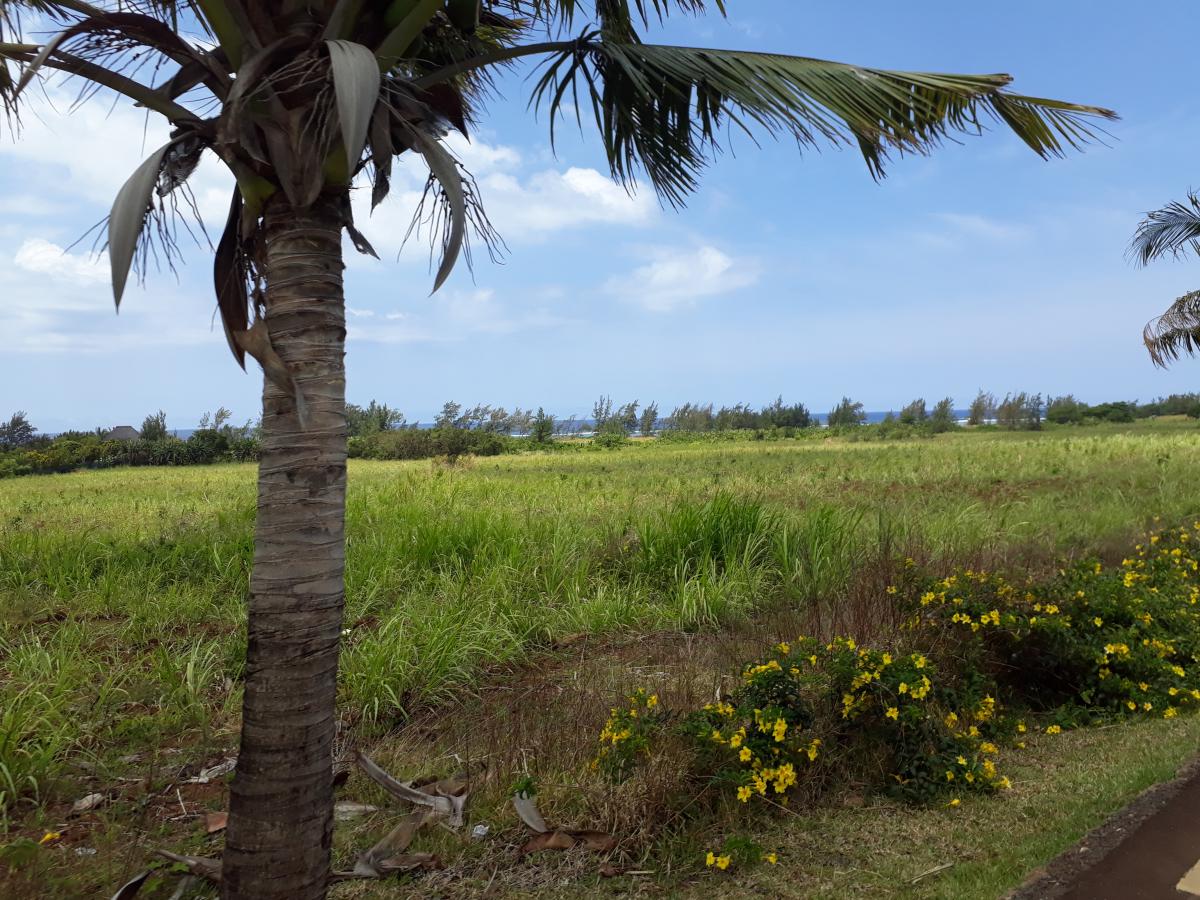
An amazing story-telling and reflection on Mauritius, written by Mateus Costa Santos, from Mozambique, who recently participated in the School of Ecology in Port Louis city, Mauritius.
Kila sinu sive na mwisho wake.
Everything has its beginning.
Makonde Proverb
Riambel, south coast of Mauritius. Idyllic. As I walk to meet the group already gathered in the 4th School of Ecology, convened and organised by the Centre for Alternative Research and Studies (CARES), my mind flows in mixed thoughts, unconsciously looking for patterns to tie the beauty of this place with the drive from the Sir Sewoosegur Ramgoolan Airport, through endless fields of sugarcane, pebbled by small villages that gather and slowly expand as concrete stalagmites in a pond of sugar and agro-toxics. The full-moon meditation straight after class opens the mind and heart to the moment. Mauritians are today the result of 400 years of history in what was once a virgin island well into [the] Indian [Ocean], as seen from the southern Africa mainland.
Unlike other colonies in Africa, there is not much “pre-colonial” history here, at least as far as human settlement goes. As part of a cusp of islands left across the Indian Ocean by the migration of the Indian sub-continent, north-east from Madagascar, virtually all main naval powers from the 1500s and there about have known of this place. Arabs and Portuguese have been here and gave the island their own names, but really the main imperial powers involved were Holland, France, and Great Britain.
Besides its geo-political importance, the island was blessed with unique and abundant beauty and biodiversity, but also vast arable lands. These were quickly distributed to local barons, who by the time of the end of slavery in 1835 had already established vast sugar plantations across the island. In befitting colonial capitalist logic, the island was populated by Chinese, Malay, Africans – mostly Mozambicans, but also Senegalese –, Malagasy and a lot of labourers from colonial India, who supplied the much-needed labour to the plantations, local industry, and economy.

At night, we share another great home-made meal, prepared by our dear very own in kitchen. All participants volunteer to different housekeeping tasks, as part of the militant work of the School. So, after washing my own dish and doing my share in cleaning up the place after the meal, we gather around the fire, by the water and under the stars, and I get my first taste of sega. As songs pulled by the Rodriguaisare responded to by the Reunionnais, and theirs responded by Mauriciens, it is clear that these islands are more than just Africa – they are the Indian Ocean. For an outsider and conditioned mind like my own the diversity of the moment jumps to the eye. In this land considered to have overcome the cast system, but where these still draw the sitting maps of weddings, islanders are perfectly in rhythm and in tune, in one with the music and the elements. This contagious African rhythm is in the blood of every Mauritian, regardless of her/his origin. My thoughts continue to dwell in the realms of duality and the unique moment we are going through as a civilisation.
Hata silongo sive sambone zaidi asinaulula.
Even the most beautiful pot cannot produce food.
Makonde Proverb
There is something about island living in the 21st century. As the sea keeps rising, there is nowhere to run to but inland – if you have any left. As we continue to learn about the current multifaceted threats facing the island nations and coastal regions of the Indian Ocean, we see that governments and corporations are predictably more interested in never-ending power games than in actually facing the facts and adapting to the new realities of the Anthropocene.
Here in Mauritius, where 90 percent of the arable land is used to grow sugar cane, only 8 percent of the population are involved in agriculture, and 70 percent of its food is imported. In a country where 90 percent of its national territory is in water, small-scale fisherfolk are not allowed to sail beyond the narrowly defined shallow waters, or to sell their catch in open-market, and remain among the poorest layers of this society. Faced by a degradation of its position in the international sugar market, the local land barons are re-inventing their business model, increasingly diversifying land-use to focus on real estate development, most prominently in the form of the new vision of smart cities – self-contained gated communities, aimed at the high-end market.
As an island state, Mauritius’ government and economic elites seek further and harder integration to the globalised economic web (both virtually and physically), apparently seeing it as the only way forward and out of the crisis. As it continues to building itself as a key stop-over in international finance – largely focused on India, China and South Africa – and as a key high-tech hub in the region, the Government of Mauritius is also positioning itself as the poster-child of the new push for “ocean economies”, playing hard and dirty on the Blue Carbonagenda, as well as in international fisheries concessions and agreements.
While recently having attained a favourable ruling in the International Court of Justice over their sovereignty over the Chagos Islands, a locally famous caricature is the case of a new whale fishing agreement signed with Japan, where when questioned about ecological concerns of the deal, the incumbent Minister of Environment simply replied: “I have never seen whales in Mauritius”.
Kenga sombo sako ni nyundo gweka undaona matatizo kwa stali zako.
If your tool is only a hammer, you will see all problems as nails.
Makonde Proverb
In the meantime, on dry-land, the continued rush for prime beach-front properties for high-end real estate development is vicious and unforgiving, despite the major advances made in national environmental law. Littered with dead, bleached coral as most of Mauritian beaches nowadays, Beau Champsis one the few pristine areas of coastal reef in the island. Here, sugar cane grows from the mountains, through the coastal wetland, all the way to the beach – literally. As outlined by local nature rights activists, the brilliant plan is to build yet another exclusive resort over a narrow stretch of dunes, located between the beach, a patch of wetland, and the main road, one hundred metres away.
In its rush to keep afloat in the international economy, and blinded by the greed and corruption of national and foreign elites, the government continues to issue development licenses in what should be environmental sanctuaries, or at least areas of high risk for human settlement. My mind still wanders in the contradictions. In their craze to see the ocean, as if for one last time, they place their comfortable holiday properties and resorts mere centimetres above the ever-rising balmy waters, blissfully unaware of the monster sleeping at their feet.
Here beaches are being grabbed from the public, in favour of private investors, in order to enhance the “natural experience of Mauritius”. In a country surrounded by open ocean, salt pans are converted into flashy touristic properties. Table salt is imported. As my friend Christian explains, Mauritius is upside-down – the sun rises from the west, and sets in the east; sail straight south to get to Dubai.
Hata lijeneza hatalikava na malidadi dasi, hainantenda sinu.
However beautiful the coffin is, it cannot make anyone wish for death.
Makonde Proverb
As we gather from over 20 different nations from the Indian Ocean and around the world, for this beautiful moment for learning and sharing in Riambel, this heavenly corner of the island can make one believe he/she is living an abstraction from reality. Not so. This is as real as the sugar plantations just across the road from here. And more, the contradictions are not only out there, in the outside world. Movements also have their contradictions. Take the microcosm of this moment, as much as we in this School are all seriously committed to doing our share changing the world for the better, a few of us did not fulfil their duties to keep the place clean and tidy, and very few of us cleaned up after the amazing closing celebration, marked by dinner at the beach with great local music by local artists and some of our very own.
As we become aware of what patriarchy is, and how its violence takes shape in our daily lives, it is still a challenge to transform this in a logic that is empowering both for women and for men, without reverting to repetitions of old patterns of organisation of power. What is masculinity and femininity in the 21st century? In a continent where youth are the majority, how do we empower them as the Aires to our victories and shortcomings, both as a society and as individuals? How can we recognise the rights of Nature and reconcile that with the immediate needs of society? What are the real needs of Humanity? How does this relate to our individual and collective spiritual awakening, devoid of religion, dogmas and cults to personality?
Asipali indila ya mkato ya kudungukila muwa ya mnadi.
There are no shortcuts to reach the top of a palm tree.
Makonde proverb
My personal view is that we all have a purpose in life – that life is our purpose. Regardless of the direness of our situation, my heart feels that we have already started our new path of progress, and that although it will not be easy, and maybe not in any sense romantic as the fabled revolutions of the left – or dystopic as those of the right – the revolution of our civilisation has already started and in some respects is well underway. Where does the inspiration come from? Nature, and the Love for the human experience. The struggle is global and so is our hope. The mind continues to wander.
*Mateus Costa Santos is an activist from Mozambique.
- Log in to post comments
- 9742 reads



































